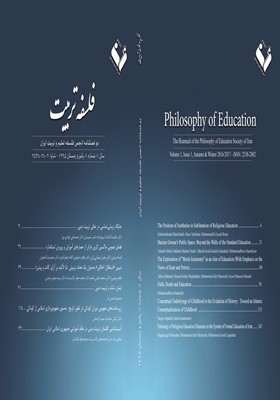Conceptual Underlyings of Childhood in the Evulution of History: Toward an Islamic Conceptualization of Childhood
Subject Areas : تاریخ و ماهیت رشته فلسفهٔ تعلیموتربیت، مکاتب و رویکردهای فلسفهٔ تعلیموتربیت قدیم و جدید ،تاریخ اندیشه و عمل تربیتی (سیاستها، برنامهها، اقدامات و...) مفاهیم، گزارهها و نظریههای تربیتی آراء مربیان و فیلسوفان تربیتی روششناسی پژوهشهای تربیتی انواع تربیت مسائل تعلیموتربیت ایران و جهان برنامه درسی و آموزش در رشتههای گوناگون
1 - University of Tehran
2 - Allameh Tabataba'i University
Keywords: Child, adult, conceptual analysis, ability, emotion, volition,
Abstract :
The main aim of this study is to investigate and analyze the evolution of the concept of childhood through human history. First of all, we traced the various meanings of childhood in four historical periods (Ancient period, middle Ages, Renaissance and ultimately contemporary period) and their implications for child education. After that, applying conceptual analysis as our method we attempted to infer the key conceptual elements of childhood. Accordingly, this analysis provides four perspectives against which the conceptual patterns of childhood could be categorized and investigated. These perspectives, in spite of their different definitions and approaches toward child education, put forward four essential questions to be answered by philosophers of education dealing with childhood concept. The dependence of childhood concept on the concept of adulthood, and the nature of this dependence, is related to the first question. The second question is about the value dimensions of human nature and its nascent state in the child. The third question focuses on children’s abilities and the mechanisms of their growth, and the final question is concerned with the various dimensions of these abilities involving cognition, emotion and volition. Along the above line of thought, the four aforementioned components were considered for a possible use in connection with an Islamic approach to child education.This approach attempts to organize educational activities on the basis of the presence of one ability versus the absence of another.
ارسطاطالیس (1356 شمسی/2536 شاهنشاهی). اخلاق نیکوماخس (ابوالقاسم پورحسینی، مترجم؛ جلد: 1). تهران: انتشارات دانشگاه تهران.
آزادمنش، سعید (1393). تبیین ماهیت دوران کودکی از منظر رویکرد اسلامی عمل و «تربیت» اخلاقی کودک بر اساس آن. (پایاننامه کارشناسی ارشد فلسفه تعلیم و تربیت). دانشگاه تهران، تهران.
افلاطون (1374). جمهور. (فؤاد رحمانی، مترجم؛ چاپ: 6). تهران: انتشارات علمی و فرهنگی.
افلاطون (1390). پروتاگوراس، (محمدحسن لطفی و رضا کاویانی، مترجمان). در آثار افلاطون (جلد: 1؛ چاپ، 2). تهران: انتشارات خوارزمی.
آگوستین (1382). اعترافات. (افسانه نجاتی، مترجم). تهران: پیام امروز.
استرینس، پیتر (1388). دوران کودکی در تاریخ جهان. (سارا ایمانیان، مترجم). تهران: نشر اختران.
باقری، خسرو (1391). نوآوری: تعلیم و تربیت اسلامی- چارچوب تئوریک و کاربرد آن. تهران: شورای عالی انقلاب فرهنگی.
باقری، خسرو (1382). هویت علم دینی. تهران: سازمان چاپ و انتشارات.
خسرونژاد، مرتضی (1389). معصومیت و تجربه؛ درآمدی بر فلسفه ادبیات کودک (چاپ: 3). تهران: نشر مرکز.
دورانت، ویل (1370). تاریخ تمدن (حمید عنایت و همکاران، مترجمان؛ جلد: 3). تهران: انتشارات آموزش انقلاب اسلامی.
روسو، ژان ژاک (1348). امیل یا آموزش و پرورش (غلامحسین زیرکزاده، مترجم). تهران: انتشارات شرکت سهامی چهر.
سجادیه، نرگس؛ مدنی فر، محمدرضا و باقری، خسرو (1394). اهداف واسطی «تربیت» در دوران کودکی بر اساس رویکرد اسلامی عمل. تربیت اسلامی، 10 (21). 39-65.
سروش، عبدالکریم (1362). «فلسفه علوم انسانی». نشریه رشد.
شاهآبادی، حمیدرضا (1385). مقدمه بر ادبیات کودک؛ بحثی در شناخت مفهوم دوران کودکی (چاپ: 2). تهران: انتشارات نغمه نو اندیش.
عالی، مرضیه (1392). تحلیلی تبارشناسانه بر سیر تحول نظامهای آموزشی. چهارمین همایش انجمن فلسفه تعلیم و تربیت ایران: مشهد.
عطاران، محمد (1366). آراء مربیان بزرگ مسلمان دربارهی تربیت کودک. تهران: سازمان چاپ و انتشارات وزارت فرهنگ و ارشاد اسلامی.
مایر، فردریک (1374). تاریخ اندیشههای تربیتی (علیاصغر فیاض، مترجم؛ جلد: 1). تهران: انتشارات سمت.
نقیب زاده، میرعبدالحسین (1388). نگاهی به فلسفه آموزش و پرورش (چاپ: 24). تهران: نشر طهوری.
هرست، پل هیوود و پیترز، ریچارد استنلی (1389). منطق تربیت؛ تحلیل مفهوم تربیت از نگاه فلسفه تحلیلی (فرهاد کریمی، مترجم). تهران: انتشارات علمی و فرهنگی.
یوسفی، ناصر (1391). رویکردهای آموزشی در کار با کودکان خردسال. تهران: انتشارات کارگاه کودک.
Aries, P. (1962). Centuries of childhood: A Social history of family life (Robert Baldick, Trans). Libraries Plon.
Bradley, K. (2013). Images of childhood in classical antiquity, in Paulo S. Fass (Ed.). The Routledge history of childhood in the Western world. (pp. 17-39). New York: Routledge.
Coombs, J. R. & Daniels, L. R. B. (1991). Philosophical inquiry: Conceptual analysis, in Edmund C. Short (Ed.). Forms of Curriculum Inquiry. New York: State University of New York Press.
Curtis. S. J (1958). An introduction to the philosophy of education. London: University Tutorial Press LTD.
Duschinsky, R. (2013). Augustine, Rousseau, and the idea of childhood. The Heythrop Journal, 77-88.
Egan, K. (2012). Primary understanding: Education in early childhood (Vol. 27). London: Routledge.
Egan, K. (1997). The educated mind: How cognitive tools shape our understanding. Chicago: University of Chicago Press.
Froebel, F. (2005). The education of man (W. N. Hailmann, Trans). New York: Dover Publications Inc.
King, M. L. (2013). Children in Judaism and Christianity, in Paulo S. Fass (Ed.). The Routledge history of childhood in the Western world (pp. 39-61). New York: Routledge.
James, A. & Prout, A. (1997). Constructing and reconstructing childhood: Contemporary issues in the sociological studies of the childhood. London: Taylor & Francis Inc.
Heywood, C. (2001). A history of childhood: Children and childhood in western from the medieval to modern times. Cambridge: Polity Press & Blackwell.
Lascarides, V. C. & Hinitz, B. F. (2011). History of early childhood education. New York: Routledge.
Goldson, B. (1997). Childhood: An introduction to historical and theoretical analysis, in Phill Scraton (Ed.). ‘Childhood’ in ‘crisis’. New York: Rutledge.
Piaget, J. (1932). The moral judgment of the child. London: Routledge and Paul Ltd.
Scheffler, I. (1985). Of human potential: An essay in the philosophy of education. Boston: Routledge and Kegan Paul.
Sommer, D.; Samuelsson, I. P. & Hundeide, K. (2010). Child’s perspectives and children’s perspectives in theory and practice. London: Springer.
Winn, M. (1983). Children without childhood. New York: Pantheon Book


